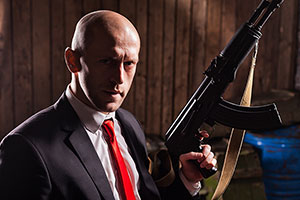Dalia Dippolito was charged with hiring a hit man to kill her husband. In 2011, Dippolito was convicted of soliciting an undercover police officer to commit the murder. The verdict was overturned on appeal because an error in selecting the jury deprived Dippolito of a fair trial.
Dippolito changed lawyers and her case went to trial again in December 2016. Dippolito’s defense of entrapment hinged on the claim that police officers in Boynton Beach, Florida set her up because they wanted to appear on an episode of COPS. The desire of the police to look good on television backfired when an evenly divided jury was unable to reach a unanimous verdict. A mistrial was declared.
Defense evidence in the third trial relied heavily on expert witnesses. The judge allowed one expert to testify, disallowed a second, and gave conditional approval for the third expert to testify.
Police Procedures Expert
The defense called retired LAPD detective Timothy Williams as an expert in police procedures. Williams testified that Boynton Beach police mishandled the investigation from its inception.
The investigation began when Dippolito’s former lover, Mohamed Shihadeh, contacted the police to report that Dippolito wanted to have her husband killed. According to Williams, the police made several mistakes.
First, they disregarded concerns that Dippolito was a domestic abuse victim. Instead of focusing on how they could arrest Dippolito for committing a crime, they should have focused on how to prevent the crime by protecting Dippolito from abuse.
Second, the police did not follow Dippolito or her husband and did nothing to protect her husband from harm. If the police seriously believed that the husband was at risk, Williams would have expected them to take action to protect him.
Third, Williams faulted the police for forcing Shihadeh to act as an informant by threatening to arrest him if he refused. Williams said that coercing Shihadeh tainted the investigation.
Fourth, Williams told the jury that the police should have recorded key conversations between Shihadeh and Dippolitio while Shihadeh was acting as an informant, rather than relying on Shihadeh to recount those conversations truthfully. Shihadeh had an incentive to lie, after all, if giving false information that was helpful to the police would help him avoid arrest.
Finally, Williams testified that it was inappropriate for the police to invite COPS to film the investigation. He suggested that the police should try to make a good case, not good television.
The prosecution countered that Williams was unfamiliar with the facts. For example, Williams testified that no money changed hands, despite evidence that Dippolito gave Shihadeh $1,200 in cash that Shihadeh was supposed to give a hit man for the purchase of a gun and cell phones. He also had not seen certain texts that the prosecution relied upon.
The weight the jury gave to Williams’ testimony is unclear. His cross-examination, however, highlights the need for expert witnesses to conduct a careful review of all evidence that might be relevant to their expert opinions before they testify.
Body Language Expert
The defense proposed to call Susan Constantine-Perfido as an expert in body language and human behavior. She would have testified that “Dippolito’s facial expressions on the undercover police video don’t show that she intended to have her husband killed.”
In particular, the prosecution relied on a video in which Dippolito told a police officer posing as a hit man that she was “5,000 percent sure” she wanted her husband dead. The defense wanted Constantine-Perfidio to testify that because Dippolito shook her head “no” when she made that statement, she must have been lying.
There is some support for the notion that “microexpressions” cannot easily be faked and that people can be trained to recognize them. On the other hand, it is one thing to say “her face shows that she was surprised” and quite another to say “her face shows that she did not intend to kill her husband.” Microexpressions reveal emotions, not intentions.
We spend our entire lives communicating with others, and in that sense, we are all experts at interpreting expressions. The judge concluded that the jury was just as capable as the expert of interpreting Dipplolito’s body language. The judge therefore disallowed the proposed testimony.
Battered Women’s Syndrome Expert
The defense listed Dr. Lenore Walker as a potential expert witness. Dr. Walker did pioneering research into battered women’s syndrome.
The judge ruled that Walker could testify to support a defense of subjective entrapment, if evidence suggested that police officers’ actions made Dippolito feel she was forced to go through with the murder plot. Walker was prepared to testify that Dippolito was “easily open to coercion from former lover, Mohamed Shihadeh, who Dippolito’s attorneys say forced her to go through with the plot under pressure from Boynton Beach police.”
Walker would have testified that Dippolito suffered from Post-Traumatic Stress Disorder after having been in an abusive relationship, and that her PTSD made her easily coerced by men. The judge, however, conditioned that testimony upon Dippolito’s submission to a mental health examination by the state’s expert. Dippolito did not appear for that examination because the defense refused to surrender Dippolito’s Fifth Amendment right to remain silent.
Ultimately, the court concluded that Walker would not be allowed to testify. If Dippolito had testified that she was a battered woman and that she wanted to kill her husband for that reason, Walker’s testimony might have been relevant. Since the defense is maintaining that Dippolito did not intend to have him killed, and since Dippolito did not testify, the judge decided that Walker’s expert testimony would not be relevant.




